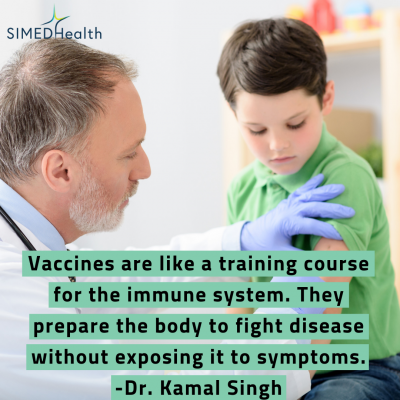
It is August, which means school is right around the corner, and flu season will be upon us before we know it. Now is the time to make sure you and your children are up to date on your vaccinations. We spoke to primary care physician Dr. Kamal Singh about immunizations and how they spread.
Vaccines are like a training course for the immune system. They prepare the body to fight disease without exposing it to symptoms. When foreign bacteria or viruses enter the body, immune cells respond by producing antibodies. "These antibodies fight the invader known as an antigen and protect against further infection," says Dr. Singh.
Unfortunately, the first time the body faces an invader, it can take several days to ramp up this antibody response. Dr. Singh says, "For severe antigens like the measles virus or whooping cough bacteria, a few days is too long." The infection can spread and kill the person before the immune system can fight back.
Vaccines are safe and given to millions of healthy people - including children - to prevent serious diseases. Every licensed and recommended vaccine goes through years of safety testing, including:
- Testing before it's licensed by the Food and Drug Administration (FDA) and approved for use by the Centers for Disease Control and Prevention (CDC).
- Monitoring the safety after approval for infants, children, and adults. Once it is approved, it continues testing. The company that makes the vaccine tests batches it to make sure the vaccine is:
- Potent
- Pure
- Sterile
The FDA reviews the results of these tests and inspects the immunization producing factories. These inspections ensure the vaccine meets standards for both quality and safety.
Dr. Singh says, "The U.S. has one of the most advanced systems in the world for tracking vaccine safety." Each of the infection systems below supplies a different type of data for researchers to analyze. Together, they help provide a full picture of vaccine safety.
By understanding how people can catch an infectious disease, you can then take effective action in preventing their spread.
Infectious diseases have different ways of spreading from person to person. Through the air, through direct contact, and contaminated objects or surfaces are the three primary ways.
Childhood immunizations can seem overwhelming when you are a new parent. Dr. Singh says, "Vaccine schedules recommended by the agencies and organization, such as the CDC, the American Academy of Pediatrics, and the American Academy of Family Physicians cover about 14 different diseases."
Vaccinations not only protect your child from deadly diseases, but they also keep other children safe by eliminating or significantly decreasing dangerous illnesses.
Dr. Singh says, "Contraindications or conditions in a recipient that increases the risk for a severe adverse reaction and precautions to immunizations are good reasons not to receive a vaccine." Most contraindications and precautions are temporary; vaccinations often can be conducted later when the condition no longer exists.
Every vaccine has a list of contraindications based on the profile of the vaccine. For example, severely sick persons generally should not receive live vaccines. Also, the presence of moderate or severe acute illness and a personal or family history of seizures are precautions to the administration of vaccines.
Dr. Singh sees patients in Gainesville, and you can click here to schedule an appointment with him!